Essential Book List for PSIR Optional Subject
For UPSC aspirants who have chosen Political Science and International Relations (PSIR) as their optional subject, selecting the right books is a crucial step in their journey towards success. In this article, we present a concise and comprehensive book list for PSIR optional that will help you prepare effectively for the UPSC Mains examination. These recommended readings, carefully curated by Kamaraj IAS Academy, cover the entire PSIR syllabus and will serve as valuable resources to master this subject.
Paper 1 - A Section: Political Theory
| Book Title | Author |
|---|---|
| Political Theory: An Introduction | Andrew Heywood |
| Political Ideologies | Andrew Heywood |
| An Introduction to Political Theory | O.P. Gauba |
| Contemporary Political Philosophy: An Anthology | Robert E. Goodin and Philip Pettit |
Paper 1 - B Section: Indian Government and Politics
| Book Title | Author |
|---|---|
| Indian Polity | M. Laxmikanth |
| Our Parliament | Subhash C. Kashyap |
| Indian Government and Politics | B.L. Fadia |
| Introduction to the Constitution of India | D.D. Basu |
| India Since Independence | Bipan Chandra |
Paper 2 - A Section: Comparative Political Analysis and International Politics
| Book Title | Author |
|---|---|
| Introduction to the Study of International Relations | Hans J. Morgenthau |
| International Relations | Joshua S. Goldstein and Jon C. Pevehouse |
| World Politics: Interests, Interactions, Institutions | Jeffry A. Frieden and David A. Lake |
| Global Politics | Andrew Heywood |
| Comparative Politics Today: A World View | Gabriel A. Almond, G. Bingham Powell Jr., Russell J. Dalton |
Paper 2 - B Section: Indian Government and Politics
| Book Title | Author |
|---|---|
| Indian Foreign Policy: An Overview | Avtar Singh Bhasin |
| India's Foreign Policy Since Independence | V. P. Dutt |
| India and the World: Through the Eyes of Indian Diplomats | Surendra Kumar |
These books have been carefully chosen to cover the entire PSIR syllabus effectively. However, it's important to note that while these are the core readings, supplementary materials, research papers, and current affairs will also play a crucial role in your preparation.
How to Use These Books Effectively?
1. Study Systematically: Begin your preparation by creating a study plan that allocates time for each book and topic. Stick to your schedule to ensure comprehensive coverage.
2. Make Notes: While reading, take notes of important concepts, theories, and examples. Creating your own concise notes will help in quick revisions.
3. Practice Answer Writing: As you progress through your reading, practice answering previous years' UPSC questions and model questions from these books. It will improve your answer-writing skills and exam readiness.
4. Stay Updated: Keep abreast of current events and issues, especially those related to international relations and Indian politics. This will help you connect theoretical knowledge with real-world situations.
5. Join Discussion Groups: Engage in discussions with fellow aspirants or join online forums to gain different perspectives and deepen your understanding of the subject matter.
6. Revise Regularly: Consistent revision is essential. Revisit your notes and books regularly to reinforce your understanding.
7. Seek Guidance: If you have doubts or face challenges in understanding certain topics, don't hesitate to seek guidance from your mentors or teachers at Kamaraj IAS Academy.
In conclusion, the recommended book list for PSIR optional for UPSC Mains, as provided by Kamaraj IAS Academy, covers all the essential aspects of the syllabus. However, remember that success in the UPSC examination requires not only extensive reading but also critical thinking, analytical skills, and effective answer writing. Utilize these books as tools to build a strong foundation, and complement your preparation with consistent practice and revision. With dedication and the right resources, you can master PSIR and achieve your goal of becoming a civil servant.


 "UPSC-2026-PRELIMS COMBINED MAINS FOUNDATION PROGRAMME" STARTS WITH ORIENTATION ON FEB-10
"UPSC-2026-PRELIMS COMBINED MAINS FOUNDATION PROGRAMME" STARTS WITH ORIENTATION ON FEB-10